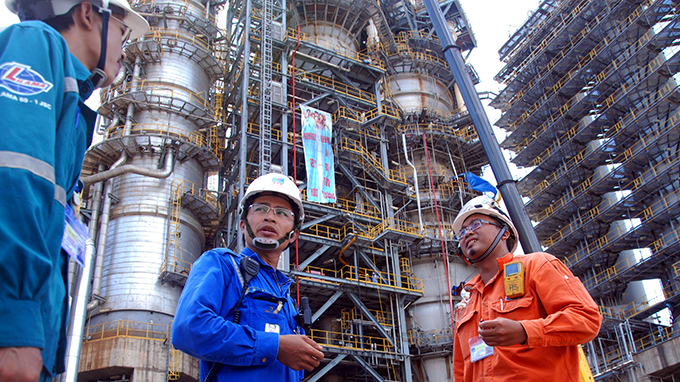Binh Son Refining and Petrochemical JSC (BSR), the operator of Vietnam's sole operational oil refinery of Dung Quat, has sought for further reduction in import tax levied on diesel oil because without the tax cut, diesel oil churned out by the facility cannot compete with that imported from ASEAN countries.
In a document submitted to the Ministry of Finance earlier this week, Dinh Van Ngoc, general director of the company, proposed a reduction of diesel import duties to below 10 percent.
Currently, diesel oil produced by the US$3 billion refienry is subject to a 20 percent import tax, a 10-percent drop from the previous rate, though it is domestically made following a special financial mechanism applied to the refinery, which was commissioned in 2010.
Meanwhile, the import duties imposed on the similar petroleum product imported from ASEAN countries has dropped to 15 percent since this year following the integration roadmap in ASEAN Economic Community of Vietnam.
ASEAN members include Indonesia, Malaysia, the Philippines, Singapore, Thailand, Brunei, Myanmar, Cambodia, Laos, and Vietnam
Thus, the price of diesel made by Dung Quat will be around US$10 per barrel more expensive than its regionally produced rivals, Ngoc said in the document.
With the current tax regime, diesel oil refined by Dung Quat cannot compete with that imported from other ASEAN countries, he added.
Diesel oil is the main product of the Dung Quat oil refinery, as it accounts for about 50 percent of the total output of the plant. As a result, if it is not sold well, the revenue of the plant will be affected, thus badly influencing state revenue.
Earlier this month, BRS also sent a document with the same import tax cut proposal for many kinds of petroleum products, stressing that the plant will shut down if there is no change in tax policies for those products.
BSR said in the document that many of its customers may switch to buying from other ASEAN countries, whose products are now cheaper thanks to the tax cut taking effect since the beginning of this year.
BSR’s parent company, state-run oil and gas giant PetroVietnam, has also lodged a similar complaint to the finance ministry, saying the ASEAN preferential tax treatment has caused Dung Quat fuel to be more expensive than imported products, thus reducing its competitiveness right on home soil.
On April 13, the Ministry of Finance issued a circular reducing the import taxes levied on gasoline and kerosene (from 35 percent to 20 percent), diesel oil (from 30 percent to 20 percent), fuel oil (from 35 percent to 25 percent) and jet fuel (from 25 percent to 10 percent).
Dung Quat currently produces 140,000 barrels of oil a day, or 6.5 million tons a year. Once it produces 10 million tons of oil per year, Dung Quat will account for 50 percent of Vietnam’s fuel supply. BSR reported VND150.41 trillion ($7.08 billion) in revenue in 2013.
Like us on Facebook or follow us on Twitter to get the latest news about Vietnam!



















































